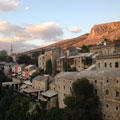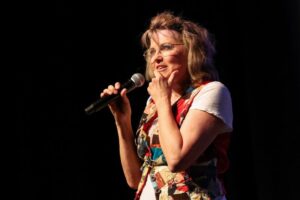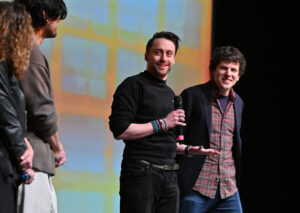Musa Syeed discusses community engagement with local youth activists in Sarajevo, Bosnia.
Musa Syeed, director, Valley of Saints
Musa Syeed, the director of Valley of Saints, documents his experience with FILM FORWARD in Bosnia and Herzegovina where he screened his film and engaged in dialogue with local audiences.
Some of my earliest memories as a kid are of going to political rallies with my family. Living in Washington, D.C., there always seemed to be something to march for, but mostly we went out to raise awareness about the conflict in my parents’ homeland of Kashmir. I didn’t understand the politics, but the rallies were fun: we painted signs, spent the day outside, and were allowed to yell as loud as we wanted–it was in fact encouraging. What I did understand is that we wanted an end to violence. And in 1993, when I was still in elementary school, we took to the streets to show our solidarity with the people of Bosnia and Herzegovnia (BiH), who were struggling to survive their own brutal war.
All these years later, after getting to know and see the Kashmir conflict for myself, I was excited to visit Bosnia and Herzegovina. Of course the two places are very different, but in my mind, I wanted to hold Bosnia up as a sign of hope that seemingly hopeless conflicts could be resolved. I wanted it to serve as an example of a place that healed and prospered after years of war. And while this country does provide all of that, I’m also reminded that there’s more to resolving a conflict, and to having a healthy homeland, than putting down arms.
My first screening of Valley of Saints was at the Center for Healthy Aging, a unique institution in the Balkans where the elderly can gather and take part in social activities ranging from Turkish needlework to hip hop dance classes. Our lively audience members, all of whom grew up in the peaceful times before the war, saw in the film an issue their country shares with Kashmir: the exodus of young people.
Nearly everyone in the audience had a child somewhere abroad—in America or western Europe—and they didn’t expect them to return. As one woman said, perhaps the younger generation has come to hate their homeland because of the rampant corruption here. And she didn’t blame them. Even so, the group seemed to agree that their children owe some responsibility to improving life in BiH.
Luckily, the next day I had the chance to screen the film for The Youth Initiative for Human Rights, a nationwide organization that brings together Bosniak, Serb, and Croat youth, all of whom are activists in their local communities. It was a bright, outspoken audience. When I told them what the elderly folks said about their generation, they protested—with a disclaimer of great respect to their elders—that they are committed, but they must find their own way. One young man, Benjamin, said he gave up an opportunity to study in Singapore because he wanted to help his homeland.
Although corruption is a large, thorny issue, Benjamin, with his friend Belmin, attempted to tackle it creatively. They showed me a film they made that contrasts the closing of the National Museum, because of a lack of government support, with the boom in the building of shopping malls, a symbol of encroaching capitalist greed. These two teenagers created an insightful commentary on how national identity can be sold out by corruption, their passion and ambition too big for the smartphone screen I watched their film on.
The intergenerational interactions I’ve had here remind me that people everywhere will always be facing large, seemingly intractable crises, not all of them equal, very few of them as bad as violent conflict. At the same time, I’m reminded of the resilience of the human spirit, fully embodied by the people here, and our ability to meet these challenges.
As a child at those rallies many years ago, I fully expected that my marching would bring about world peace one day. And while I’m not so naïve anymore, I’m still trying to keep up that march in my own way. Now however, I’m hoping my marching leads to peace in at least one place, a place I do control: myself.




